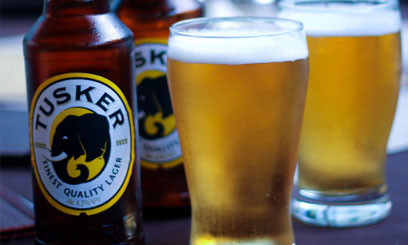
The Group’s Finance Director Tracey Barnes however indicated that the challenges were mitigated by strong performances on Tusker, Guinness and spirits/FILE
While releasing results for the six months ending December 2013 on Friday, EABL Group Managing Director Charles Ireland stated that net revenue during the period was at Sh31.8 billion compared to Sh30.6 billion posted in 2012.
He pointed out that excise duty on Senator Keg had an impact on the company’s revenue since the volume of sales dropped by 85 percent, with 3,000 outlets having stopped selling the brand.
“Our gross profit increased by nine percent and our profit after tax in H1 was Sh4.161 billion up four percent. The way I feel about that is that it was a satisfactory performance given the challenges that we faced not only on the Senator Keg but also on our Tanzania business,” he stated.
He expressed optimism of the company doing better in the next financial year.
“We are in good shape to have a decent H2 and record satisfactory overall performance in the overall financial year,” he said.
The Group’s Finance Director Tracey Barnes however indicated that the challenges were mitigated by strong performances on Tusker, Guinness and spirits.
“What this means is that for a sizable proportion of those outlets, the businesses become increasingly non-viable. We have already seen a number of people shift their businesses elsewhere and a number of outlets have already closed and that makes it increasingly difficult for us to continue with our business,” she said.
“However, as you would expect, we are fighting on all fronts. We are looking at what we can do to fast forward innovations to provide those outlets and others with other products targeted to emerging consumers.”
According to Barnes, in Tanzania net revenue declined by 11 percent as Serengeti Breweries reacted to the short term impact of new route- to – consumer initiatives as the business moved to a new distribution model which management believes will be the optimal platform for future growth.
“We continued with our strategy of investing ahead of growth in our brands, increasing our selling and distribution costs by 20 percent compared to last year and investing in new marketing campaigns to support our brand portfolio,” she stated.
She explained that a number of campaigns and initiatives had a part to play in the increasing of the company’s revenue.
“These campaigns included the region’s biggest TV reality show, Tusker Project fame 6, the Guinness “Be the Manager” campaign, Bell Lager’s welcome to the Bell Nation” campaign and the annual Serengeti Premium Lager Fiesta events,” she stated.
“Within our spirit portfolio, campaigns included the Johnnie Walker Red Label “Step Up” campaign which was enhanced by the inaugural “Love Whisky festival” in November 2013 in Kenya as well as Uganda’s Waragi’s “Vibe is on the inside” campaign,” she said.
She stated that the cost of sales declined by one percent due to a reduction in raw material costs and the implementation of initiatives to optimize production processes.
“Administrative expenses grew by 26 percent as result of the impact of one-off costs related to the recent organizational restructuring, as well as incremental investments to streamline back office processes in Tanzania,” she said.
During the period, net financing costs remained broadly flat and profit attributable to shareholders improved by five percent to Sh3.9 billion.



































